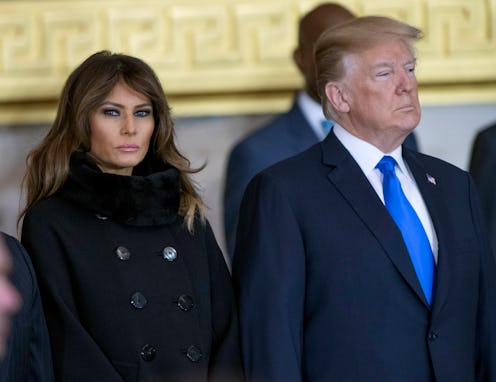News
This Is What Melania Trump, Nobel Prize Winners & Oscar Honorees Have In Common

President Donald Trump has long railed against the nation's immigration policies and recently proposed making deep cuts to legal immigration. Now, a new report from The Washington Post raises questions about how First Lady Melania Trump obtained her green card through an elite visa program typically used by international award winners while dating Trump. But what is the "Einstein visa" Melania Trump reportedly secured? The EB-1 program distributes visas to individuals who demonstrate "sustained national and international acclaim," according to U.S. Citizenship and Immigration Services.
According to The Washington Post, Melania was issued a green card through the EB-1 program in March 2001. At the time, she was working as a model and her most notable job was a bikini-clad spread in the Sports Illustrated swimsuit edition. "Mrs. Trump was more than amply qualified and solidly eligible," Michael Wildes, an attorney for the first lady, told The Washington Post; Wildes would not discuss the qualifications Melania had included in her application with the newspaper.
However, Bruce Morrison, the former Connecticut congressman behind the Immigration Act of 1990 which defined the EB-1 program, told The Washington Post he felt the accomplishments Melania could have listed in 2001 were "inconsistent" with EB-1 eligibility requirements.
"It wasn't always good enough be a player in the starting lineup of major league baseball, you had to be the most valuable player," Morrison said in a 2016 report from the Post. "The expectation was that you had to be truly extraordinary in your field. If someone came to me with her ability, I would be dubious that she would get it."
The EB-1 visa is described by U.S. Citizenship and Immigration Services as "an employment-based, first preference visa" for those who possess "an extraordinary ability," or are "outstanding professors or researchers" or a "multinational executive or manager." To be eligible, individuals "must be able to demonstrate extraordinary ability in the sciences, arts, education, business, or athletics through sustained national or international acclaim," the agency notes. Moreover, eligible individuals will have had their achievements "recognized in [their] field through extensive documentation." Evidence of a big one-time achievement such as a Nobel, Pulitzer, Oscar, or Olympic medal are a plus.
Melania has previously said she supports her husband's views on immigration. "I follow the law. I follow a law the way it's supposed to be," Melania said during a 2016 interview on MSNBC's Morning Joe. "I never thought to stay here without papers."
Melania told Morning Joe she obtained the necessary visa and would travel back to Slovenia every few months to have that visa stamped. Eventually, she applied for a green card and then, later, citizenship. "I applied for the citizenship later on after many years of green card," Melania said. "So I went by system. I went by the law, and you should do that."
Before being granted a green card through the EB-1 program in March 2001, Melania obtained five H1-B visas from 1996 to 2001, according to a letter her attorney wrote and released in 2016. It's worth noting that a number of fashion models enter and work in the United States each year using H1-B visas, which are reserved for those deemed to have special skills but who may not hold degrees. In fact, an analysis by The Washington Post claims models could apply for 40,040 H1-B visas in 1996, the year Melania first applied.
But while the H1-B visa is what allowed Melania to work in the United States, it isn't what first got her into the country. According to Wildes, Melania first entered the country on a B-1/B-2 visitor visa in August 1996 and obtained her first H1-B visa in October of that same year. Each of her H1-B visas were good for one year.
The Washington Post's latest piece follows a report published last month alleging that Melania's parents were close to obtaining U.S. citizenship. It is not clear whether they relied on so-called "chain migration," or the process where U.S. citizens sponsor or assist relatives seeking citizenship. President Trump has previously called for ending chain migration, saying the process is "not acceptable" as "people come in, and they bring their whole family with them, who can be truly evil."